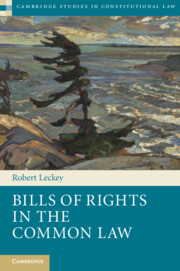Book contents
- Frontmatter
- Dedication
- Contents
- Acknowledgements
- Table of cases
- Introduction
- 1 Against bill-of-rights exceptionalism
- 2 The common law, judging, and three bills of rights
- 3 Judicial review of legislation before bills of rights
- 4 Bills of rights and other means of accessing judgment
- 5 Putting the strike-down in its place
- 6 Remedies from text to practice
- 7 Improving the system and engaging the legislature
- 8 Rethinking remedies and constitutional supremacy
- Conclusion
- Bibliography
- Index
8 - Rethinking remedies and constitutional supremacy
Published online by Cambridge University Press: 05 May 2015
- Frontmatter
- Dedication
- Contents
- Acknowledgements
- Table of cases
- Introduction
- 1 Against bill-of-rights exceptionalism
- 2 The common law, judging, and three bills of rights
- 3 Judicial review of legislation before bills of rights
- 4 Bills of rights and other means of accessing judgment
- 5 Putting the strike-down in its place
- 6 Remedies from text to practice
- 7 Improving the system and engaging the legislature
- 8 Rethinking remedies and constitutional supremacy
- Conclusion
- Bibliography
- Index
Summary
Earlier chapters have established that the exercise of remedial discretion in rights cases distances judges from remedying past wrongs to do justice to the litigant. By delaying declarations of invalidity or ruling prospectively, courts derogate from the tradition of declaring immediate and retrospective invalidity in a successful challenge to legislation. This final chapter presses the analysis further, troubling the prevailing, approving accounts of remedial discretion in rights cases. It argues that remedial discretion potentially harms litigants, increases the reach of judicial decision making, and enables judges to shape new law more boldly.
The first part of the chapter identifies concerns with remedial discretion relating to the victims of rights violations and institutional matters. For example, delayed and prospective remedies may impose substantial costs on litigants and produce horizontal inequality amongst members of a class. Institutionally, such remedies, and their ambient discretion, may undermine the certainty and horizontal fairness associated with the rule of law. The second part explores the impact of remedial discretion on judges, disputing the characterization of expanded remedial discretion as a badge of judicial modesty. These parts might convince proponents of remedial discretion, including judges, to temper their enthusiasm. They would justify a more sparing approach to the use of remedial discretion in deviating from immediate and retrospective remedies. At minimum, they press supporters of remedial discretion to complicate their accounts by recognizing the costs that their favoured approach imposes.
On a more theoretical level, the third part contends that the prominence of remedial discretion makes it necessary to reconceive the character of constitutional supremacy as it applies to a bill of rights. Judges do not strike down legislation under a supreme bill of rights as straightforwardly as people may imagine. As the product of judicial discretion, remedies in rights cases do not flow directly from the idea of constitutional supremacy or the theory of nullity.
- Type
- Chapter
- Information
- Bills of Rights in the Common Law , pp. 170 - 190Publisher: Cambridge University PressPrint publication year: 2015



